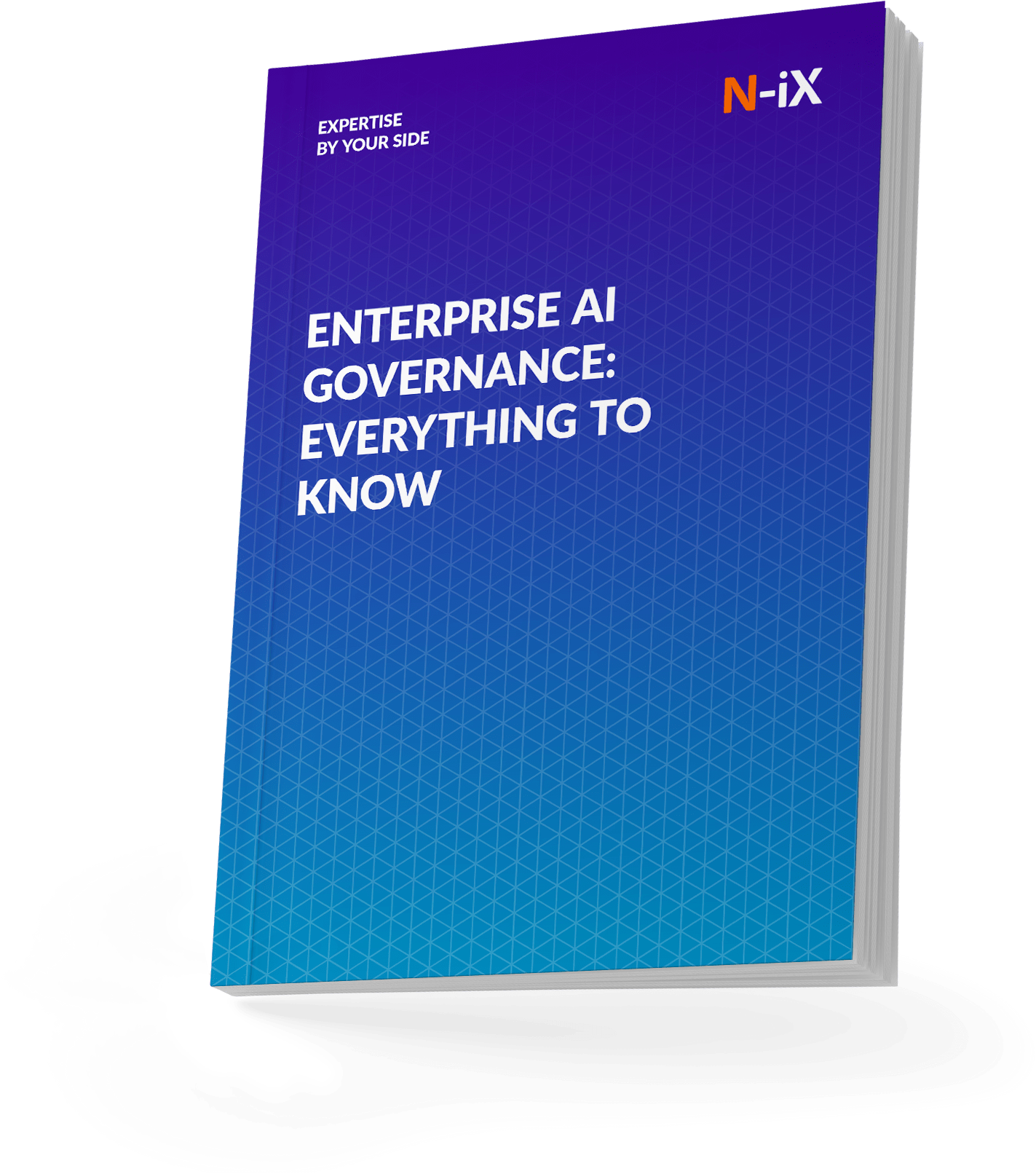Enterprises lose an average of $15 million annually due to poor data governance, a fundamental factor that directly impacts AI initiatives. The root cause is clear: businesses treat AI data like traditional business data. It's a costly mistake. As businesses face wasted resources, inefficient operations, and missed opportunities due to unreliable AI outputs or failed projects
Traditional data governance-designed for periodic reporting and static databases-breaks down under AI's demands. Enterprise AI needs different controls: automated quality monitoring, real-time validation, and continuous compliance checks. AI models drift, make biased decisions, or fail completely without them.
That's where data governance services make all the difference for AI. A well-defined data governance framework ensures data quality, secures sensitive information, and supports ethical AI usage. Let's explore how a strategic approach to AI data governance can help enterprises build reliable, secure, and compliant AI systems.
Risks from unsupervised data governance for AI
AI systems aren't static; they evolve by continuously processing diverse, often unstructured, datasets. This dynamic nature makes them susceptible to errors, bias, and inconsistencies if data governance is overlooked. In this section, we'll examine the most critical risks of insufficient data governance in AI and how they can disrupt operations, erode trust, and increase regulatory scrutiny-key concerns for enterprise leaders.
Biased AI models
When AI systems lack effective data governance, they are highly susceptible to bias-a problem that sweepingly impacts decision-making and brand credibility. AI systems depend on the data used to train them, and if that data is skewed or unbalanced, the resulting models can produce prejudiced or discriminatory outputs. This bias might arise from historical inequalities embedded within the data or from sampling that does not fully represent diverse perspectives.
For enterprises, biased AI can lead to severe consequences, such as hiring tools that disproportionately favor one group over another. It can also result in lending models that discriminate against specific demographics or customer service systems that treat clients inconsistently.
Data privacy breaches
AI systems are inherently data-intensive, often drawing from vast datasets that include sensitive personal information. Without stringent governance, these systems become prime targets for privacy breaches. The immense scale and complexity of AI data make it easy for unauthorized access to slip through the cracks, leading to data exposure or misuse incidents.
Unsupervised AI can even unintentionally allow private data to be inferred from patterns, raising further privacy concerns. For enterprises managing customer data, a privacy breach can mean heavy fines, legal scrutiny, and loss of trust.

Regulatory and compliance risks
Regulatory bodies worldwide are introducing stricter rules and standards for AI, particularly regarding data usage, accountability, and transparency. For enterprises, unsupervised AI governance exposes them to the risk of non-compliance with these regulations. AI-specific legislation, such as the EU's AI Act and evolving guidelines in the US, are demanding higher accountability from organizations deploying AI, mandating documentation, explainability, and fairness.
Inadequate governance increases the likelihood of falling short of these standards, resulting in costly fines, legal restrictions, and market access barriers. Particularly for industries under heavy regulation-such as healthcare and finance-the risks of non-compliance with data and AI regulations are profound.
Mitigate AI risks and enhance compliance – get the guide to enterprise AI governance!


Success!

What are the data governance principles for AI operations?
Establishing strong data governance is more than a best practice-it's the backbone of effective and responsible AI in the enterprise. Unlike traditional data governance, which focuses on managing data availability, accuracy, and security across an organization, AI data governance extends these principles to address all the challenges we mentioned before. In this context, governance goes beyond securing data-it encompasses the entire lifecycle of data within AI models, including its sourcing, preparation, and ethical implications.
A well-designed governance framework enables enterprises to capitalize on the potential of AI while maintaining security, fairness, and accountability. It requires an active and ongoing process of monitoring and refining, ensuring that data integrity is maintained across all stages of the AI lifecycle.
Let's explore the core principles shaping this essential aspect of modern AI-driven organizations.

1. Data quality and integrity
Data quality is foundational to any AI system. When it comes to AI operations, the need for high-quality data is amplified because AI models are only as accurate and reliable as the data they process. Low-quality data can lead to skewed models, inaccurate predictions, and ultimately flawed business decisions. Ensuring data quality involves data cleansing, validation, and monitoring for consistency across sources.
For effective data quality management, enterprises need data validation and verification mechanisms. Data governance AI principles require processes that routinely assess data integrity, ensuring that information remains accurate, complete, and fit for its intended use. An advanced approach to data quality involves tracking data lineage, which traces data back to its source, offering transparency on data origins and any transformations applied along the way. This level of traceability reinforces data quality and supports compliance and accountability by documenting the entire data journey.
2. Data security and privacy
Given the scale and sensitivity of data involved in AI applications-especially in sectors like healthcare, finance, and retail-protecting data from breaches and unauthorized access is critical. Data governance frameworks for AI must include stringent security measures, such as encryption, access controls, and robust identity management protocols, to protect data integrity and prevent exposure to sensitive information.
AI data governance ensures sensitive data is safeguarded throughout its use in AI training by following three key steps:
- Data discovery: Identifies sensitive data requiring protection.
- Privacy techniques: Applies methods like anonymization to maintain privacy while enabling data use.
- Documentation: Records data handling practices for accountability and auditing, ensuring traceability.
To illustrate the practical application of these principles, let's explore how N-iX implemented a robust AI data governance framework as part of a comprehensive data analytics solution. By establishing data governance on AWS and Snowflake, N-iX ensured stringent data security and compliance, allowing secure and structured data handling across multiple stages. The use of advanced governance practices, such as Change Data Capture (CDC) and multi-layered data processing with Apache Spark. These practices enhanced the reliability and traceability of the data, ensuring accurate insights that support business growth.
To see how N-iX applied advanced data governance practices in the ecommerce industry, explore the full case study here.
3. Model accountability and transparency
In AI governance, transparency and accountability are required for establishing trust and compliance. Transparency involves providing clear visibility into the AI model's functioning, data sources, and decision-making pathways. Enterprises must ensure that data governance frameworks mandate openness at every stage of the AI lifecycle, from initial data collection to model deployment and subsequent updates.
Accountability goes hand in hand with transparency. It requires that specific roles and responsibilities be defined within the organization to monitor AI performance and data governance compliance. Establishing accountability means designating individuals or teams responsible for aspects such as data quality management, compliance monitoring, and risk mitigation.
4. Ethical standards
Ethical AI requires a focused effort to prevent and mitigate biases in data and algorithms, which, if left unaddressed, can lead to outcomes that reinforce discrimination or inequity. Inadequate governance in this area can undermine the credibility of AI, especially in customer-facing applications where fairness is not just expected but demanded.
Regular audits and fairness assessments help identify and address biases, particularly in critical decision-making areas. Additionally, using diverse datasets during training can significantly reduce biases. Establishing an ethics committee or a dedicated team within the governance structure allows organizations to proactively review AI practices.
5. Data management
Data governance AI requires comprehensive lifecycle management, which encompasses the entire data journey from collection and storage to processing, analysis, and eventual deletion. This management includes implementing data versioning and change control protocols, which help track updates and modifications to datasets and AI models. Monitoring data and model performance over time also allows enterprises to detect and address issues like data drift, which can cause model accuracy to decline if new data diverges significantly from the original training data.
6. Compliance
Governance frameworks in AI must incorporate these requirements from the outset, ensuring that practices meet legal standards and align with corporate and societal values. Ensuring data privacy compliance is a legal obligation and a trust-building factor with customers and stakeholders. For enterprises, this means implementing "privacy by design" in their AI data processes. This principle involves embedding privacy considerations into AI system architecture and data management processes from the outset.
The role of ethical standards in AI governance extends beyond mere compliance. Ethical principles within governance structures allow organizations to prioritize fairness, inclusivity, and transparency. Frameworks guided by principles like the OECD's AI recommendations or IEEE's guidelines on ethical AI promote practices that respect human rights and build stakeholder trust.
Best practices for implementing AI data governance
Drawing from N-iX's extensive experience in AI consulting services, we have developed practical, effective strategies for implementing data governance in AI systems. These approaches are specifically tailored to meet the needs of complex, data-driven enterprises.
- We prioritize automated and manual validation processes to maintain high-quality data across the AI lifecycle, preventing inconsistencies from affecting model accuracy.
- Our team implements data lineage tools to trace the entire data journey, supporting compliance and providing traceability from source to output.
- We design security protocols-including encryption and strict access controls-to protect sensitive data, ensuring our clients' compliance with regulations.
- We assign roles like data stewards and compliance officers to reinforce accountability and create clear documentation to streamline audits and compliance checks.
- Our governance frameworks are designed to grow with our clients, using scalable tools to handle large data volumes and evolving AI needs without compromising performance.
- We deploy tools that generate real-time, visual data lineage maps to identify data sources, transformations, and destinations quickly.
- In data governance for AI, we integrate techniques like anonymization and pseudonymization directly into data pipelines to protect privacy proactively.
- To maintain model transparency and performance over time, we create version-controlled libraries that log all model iterations, training datasets, and parameter adjustments.
Final thoughts
When governance is well-planned and implemented, AI models perform reliably, data stays secure, and companies remain on the right side of regulatory requirements. But beyond compliance, strong AI data governance builds trust. It reassures stakeholders, customers, and even your teams that the AI systems guiding decisions are fair, unbiased, and accountable.
So, as you move forward with AI, remember that governance is an ongoing journey, one that needs regular attention and adjustment. What is the payoff? A resilient, ethical, and compliant AI ecosystem that drives actual value for the business-and confidence in the future of your AI initiatives.
Have a question?
Speak to an expert




